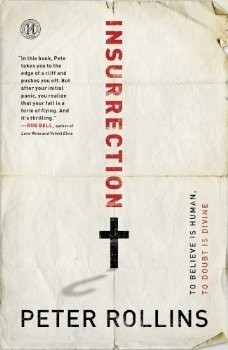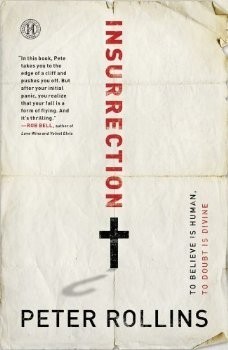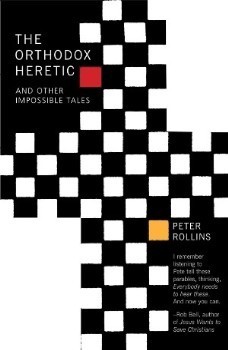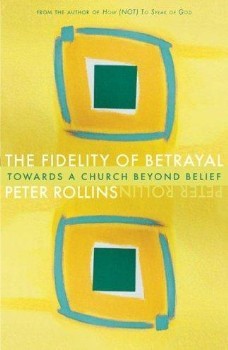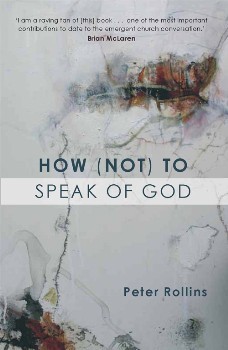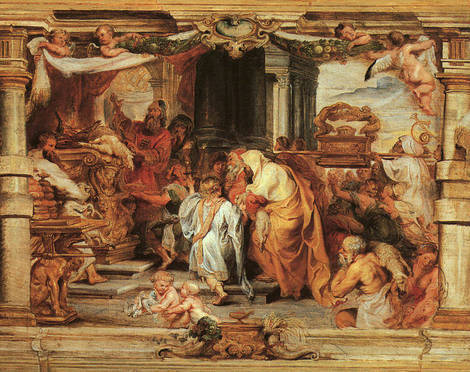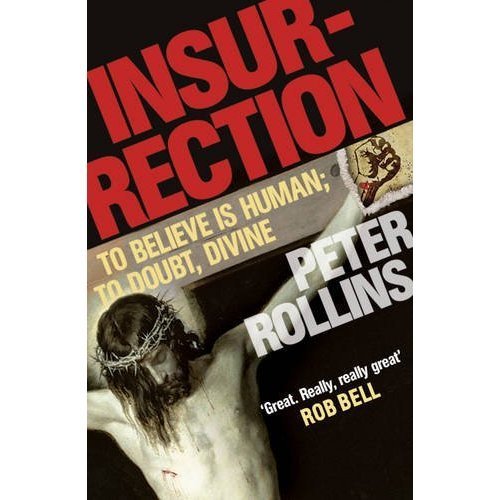Peter Rollins's Blog, page 50
September 21, 2011
First Chapter of "Insurrection"
Click on the cover to find out more…
An Invitation to Drift – Reflection 3
We are over the half-way mark with this experiment in audio reflections. Someone has kindly offered me some help in setting up a podcast channel so hopefully soon you will be able to download these reflections and carry me around in your pocket. If that works I will also look at putting other audio files up.
As you probably know already the reflections I am giving out this week offer brief commentaries on each chapter of Section One of my first book How (Not) to Speak of God. Hopefully these might be of use to any group wanting to do a book study, for those who want a little refresher course, or for people who might want to know a little about the book before buying it.
Click here for the first reflection and a little more background on why I am doing these. I am hoping that these podcasts will act as a useful springboard into my forthcoming book Insurrection.
The background track is called "Drift" and can be downloaded for free here
Click on the link for the second reflection "How (Not) to Speak of God" Reflection 3
September 20, 2011
An Invitation to Drift – Reflection 2
As promised here is the second podcast where I offer a reflection on my first book How (Not) to Speak of God. Click here, here and here if you would like a little background on why I am doing these. I am hoping that these podcasts will act as a useful springboard into my forthcoming book Insurrection.
The background track is called "Drift" and can be downloaded for free here
Click on the link for the second reflection "How (Not) to Speak of God" Reflection 2
September 19, 2011
Illuminating the World
This is an excerpt from a session at Poets, Prophets and Preachers where Rob Bell interviewed me about my work. The full interview is available in my forthcoming book Insurrection
An Invitation to Drift – Reflection 1
This week I will be releasing five audio reflections (one a day) that offer a brief reflection on each chapter from section one of How (Not) to Speak of God.
My artist/musician friend Dubh recorded an ambient track to provide a soundscape for these reflections that he has called "Drift" (you can download it for free here). I love the name because it captures the heart of what I am attempting to do in these recordings,
- If I want you to "catch my drift" I seek to convey my meaning to you. In these reflections I hope to help people catch the main drift of H(N)tSoG.
- "To drift" also conjures up the sense of moving from a fixed point or set course. It has been many years since I wrote H(N)tSoG and so I am now a reader of the text, offering my own limited interpretation of the work that no doubt drifts in some ways from the intentions of the author.
- Finally "to drift away" conveys the idea of being carried along by a current of air or water. My hope is that these short podcasts will provide a little moment of reprieve in your day, enabling you to drift away from your daily struggles for a few short moments.
The podcasts last approximately eleven minutes each. If people enjoy these and find that they are useful I will look at doing podcasts on a more regular basis (I might need help in working out how to set up some kind of podcast channel)
Click on the link for the first reflection "How (Not) to Speak of God" Reflection 1
September 17, 2011
Protect Me From Your Desire
The great Russian writer Fyodor Dostoyevsky was famously known to have been put through a mock execution for being part of a liberal intellectual group called the Petrashevsky. He and his comrades were brought outside and put in front of a firing squad. Only at the very last moment was the pardon of the Czar read out and their sentences reduced to hard labour.
Such mock executions are psychologically traumatic for they cause a person to experience the inevitability of their own extinction. Yet there is an experience that is even more difficult to bear. In order to understand this let us imagine that you are also facing execution in the same prison as Dostoyevsky. You have seen numerious people executed before you, but now you are confronted with people in the same situation as yours, who gained a reprieve at the last moment. Suddenly your own execution date (lets say several months from now) takes on a different significance. Indeed you may initially experience a rush of excitement, "perhaps I will be reprieved at the very last moment", "maybe the Czar's desire is for me to live rather than die".
Before you heard about the mock executions the desire of the Czar was clear – he wanted you dead. Now the Czar's desire is experienced as enigmatic – "what does he want of me"? A question that can become so intolerable you no longer sleep at night, or that becomes so all-encompassing as to disturb your deepest slumber. What might have initially been a moment of joy ("he might not want me dead") now becomes more oppressive than the certainty you were going to die ("there is no hope, the others desire is clear").
In order to escape the agonizing anxiety you may well have to psychologically assume the worst. For the fear of ones own death will be preferable to the anxiety of unknowing.
This analogy can help us understand why, when confronted with the enigmatic desire of someone we love, we often have to psychologically imagine the worst. For the anxiety of unknowing in the face of the other's ethereal desire is actually worse than the fear that their desire for us is to die (symbolically, or perhaps literally). At least, as a condemned man, we might be able to get a nights sleep.
It is in light of this that we can see how demands help to protect us from the desire of one we love. When two people make demands of each other there is a certain sense in which we know where we stand, the others elusive desire is seemingly pinned down and we feel that we are able to satisfy it. Whether it's, "I want you to pick up the kids", or "I want you to leave", these enable us to satisfy the others desire (though such demands are rarely as transparent as the they seem, for example, "I want you to leave", might mean, "I think you want to leave so I am asking you to go in order to see if you will stay").
Theologically speaking the true significance of contractual relations between the divine and human was not, as most people believe, to bring us closer to the divine but rather to protect us from the enigmatic desire of the divine though a set of highly regulated actions. If obeyed one was blessed, if not one was cursed. Such contracts were constructed by people in order to protect them from the holy terror generated by a confrontation with the mystery of the wholly other.
On the level of interpersonal relations we can understand how the act of marriage functions as a way of protecting us from the terror of the others elusive and fluid desire by putting the veil of demand over it. In the marriage contract promises are made that attempt to do the impossible – contain the others desire in the earthen vessel of a lasting demand (for when one makes a vow one is able to hold it against them). A type of strategy that is perhaps as necessary as it is doomed.
For the truth that we wish to avoid facing is that we cannot can look into the face of our beloved's desire and live.
(Art – Sacrifice of the Old Covenant by Rubens)
September 16, 2011
Drill the holes, plant the bombs, light the fuse and take cover
In an earlier post I wrote about a possible conflict brewing between my first book and Insurrection. However after having reread How (Not) to Speak of God (in preparation for some podcasts) I feel that the relationship between the two is perhaps more analogous to the removal of a mountaintop. As far as I can guess the first stage in such a process involves the drilling of deep holes into which are placed explosives. Then one lights the fuse and takes cover. Using this analogy I would say that H(N)tSoG represents the drilling of deep holes into the mountaintop of religion and the planting of explosives. While Insurrection represents the detonation and the subsequent exposure of the rich potentiality that lies hidden within. This is not to say however that there are no antagonisms between the two books, something I will be commenting on at a later date.
In preparation for the release of my new book I will be offering five short audio reflections on H(N)tSoG, followed closely by others delving into the main themes of Insurrection. My hope is that these will compliment the books and draw out how they might relate to one another. The first five will provide short reflections (approx. 10 mins each) on the chapters that make up section one of H(N)tSoG. I am hoping that these might be useful for groups who wish to do a book study.
In closing I should say that these audio reflections only represent my interpretation of the books, I hope that others will be encouraged to enter the conversation and engage, not only with the books themselves, but also with my interpretations of them.
September 14, 2011
Insurrection Outline and UK Edition
The UK edition of Insurrection will be available from 13th October. Here is the outline of the book in the hope that it might whet your appetite to buy it!
Introduction - There Is a Fire in the Building; Please Step Inside
Section One – Crucifixion
Chapter 1 - I'm a Christian! I'm a Christian!
Chapter 2 - To Believe is Human; to Doubt, Divine
Chapter 3 - "I'm Not Religious" and Other Religious Sayings
Chapter 4 - I Don't Have to Believe; My Pastor Does that for Me
Section Two – Resurrection
Chapter 5 - Story Crime
Chapter 6 - We Are Destiny
Chapter 7 - I Believe in the Insurrection
Chapter 8 - Neither Christian nor Non-Christian
Bonus Material
Rob Bell Interviews Peter Rollins (video accessible via smartphone)
Reading Group Guide
Author Interview
Dis-Courses
This is an excerpt from a session at Poets, Prophets and Preachers where Rob Bell interviewed me about my work. The full interview is available in my forthcoming book Insurrection
Peter Rollins's Blog
- Peter Rollins's profile
- 314 followers


